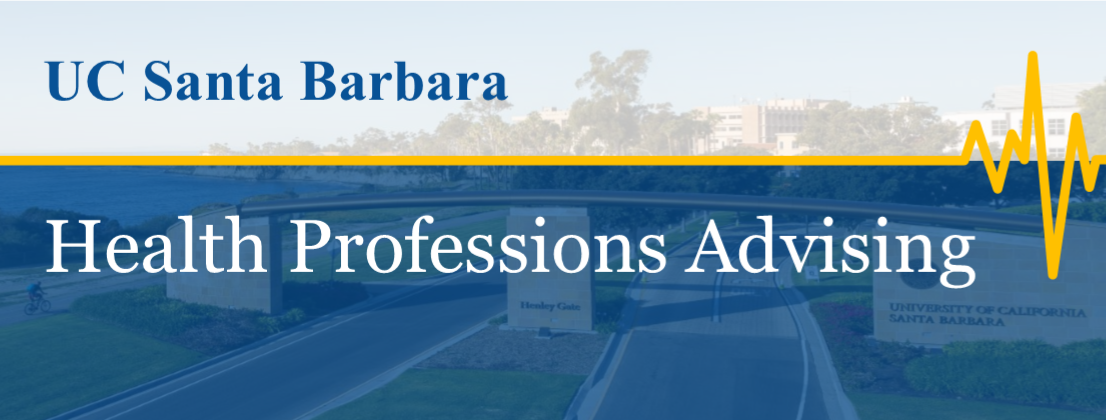Interviews
Your academic strengths (GPA + exam scores) and your descriptions of your experiences and personal statement have convinced admissions offices at the programs you have applied to that you may be a good candidate for their program. Now, it’s time for them to get know the real you! Here are a few things you can do to prepare for any interview, regardless of the format.
Attention Current Professional School Applicants
Due to the current pandemic, many professional schools will conduct admissions interviews remotely. For example, some MD medical schools will utilize the AAMC's VITA interview during this cycel. Please be sure to check your application service's website for information about these changes. Most application services or professional schools will likely have emailed applicants about these new virtual interviews, so be sure to check your personal email accounts.
If you have questions, please do not hesitate to reach out to our office.
Best of luck this cycle!
UCSB Health Professions Advising
Preparing for the Interview
Adequate and timely preparation can mean the difference between a great interview and a disaster! Below are some suggestions for students to consider as they prepare for their admissions interviews.
1. Consider attending one or more mock interviews with Career Services, and pay attention to the feedback that you receive from them regarding your interviewing skills. For example, voice, clarity of responses, eye contact, body language, etc.
2. Meet with a pre-health advisor to discuss the types of questions you may be asked.
3. Review your journal that you have been using to reflect on your extracurricular experience, as well as your resume, the experiences you included on your application, and your personal statement. This will help you to keep your experiences fresh in your mind and make them easier to recall during the interview. Also think back on other experiences that you may have had that stand out to you. These could be interactions that you had with roommates, instructors, co-workers, supervisors, etc. Think about why these experiences stand out. Did they teach you anything about yourself or about other people?
This is a good time to begin thinking about how you will prepare for the interview; specifically, how you will respond to questions. Review this PDF on the STAR Method.
4. Prepare your clothes (professional attire) ahead of time (laundered/dry cleaned, ironed). Additionally, avoid distracting articles of clothing and jewelry, such as brightly colored and/or sheer fabrics, overly large ear rings, necklaces, and rings, bulky watches and watches that might blink, make noise, or cause other distractions (ie, smart watches). Wear comfortable shoes in case there is a tour or you will need to walk a great deal.
5. Arrange travel and accommodations well in advance (flight/car rental, hotel reservations). Ensure you allow yourself ample time to travel to your interview so that you do not arrive late or disheveled.
6. Check out the location ahead of time so you know exactly where you are going.
Interview Day
The day has arrived! Ensure that you are well-rested and ready for a long day.

1. Shower, brush your teeth, and eat a good breakfast. Comb/brush/or otherwise style your hair in a professional manner.
2. Be present and pleasant at all times and with all people the day of your interview (shake hands, engage in conversation, and above all, stay off your cell phone).
3. Have good questions prepared for your interviews and do not be afraid to ask others questions about the institution and program. Take care that the questions you prepare ahead of time do not have answers that can readily be found on the institution’s website.
4. Be yourself! You were offered an interview because the admissions committee wants to get to know you better, so show them the real you.
Moving Forward
The time between interviews and being notified of offers, being declined, or being waitlisted can be stressful. So be patient, and follow the protocols that were explained during or after the interview.
1. Following your interview, adhere to each institution’s guidelines regarding follow-up communication. Some may not want you to send a thank you note, while others may appreciate the gesture.
2. You can ask after your interviews whether or not it is appropriate to ask for updates regarding your decision. Otherwise, be patient.
3. Receiving an offer of acceptance. Congrats, you've received an offer/offers! Remember, if you hold multiple offers, you should try to make your final decision in a timely manner. This ensures that schools are able to go to their waitlists if they need to and other students--who are also waiting patiently--are notified of their own standing in a timely manner.
4. Begin waitlisted. Again, be patient as the process continues. You may be called off the waitlist, but you should begin to plan for alternatives. If you received feedback from schools who denied your admission, and you are considering reapplying during a later cycle, then begin thinking about how you might improve your application. At UCSB, we also work with alumni who are considering reapplying or who are applying to professional school programs for the first time.
5. Being denied. If you received feedback from schools who denied your admission, and you are considering reapplying during a later cycle, then begin thinking about how you might improve your application. At UCSB, we also work with alumni who are considering reapplying or who are applying to professional school programs for the first time.
6. Plan B/Alternative Career Path. There is absolutely nothing bad about having a backup plan! This is one reason why we encourage students to major in an area that they are passionate in and that also caters to their academic strengths, not simply majoring in an area because they think it is what professional programs want to see. If you haven't considered a Plan B/Alternate Career Path, then meet with a pre-health advisor or a counselor in Career Services to begin exploring your options.
